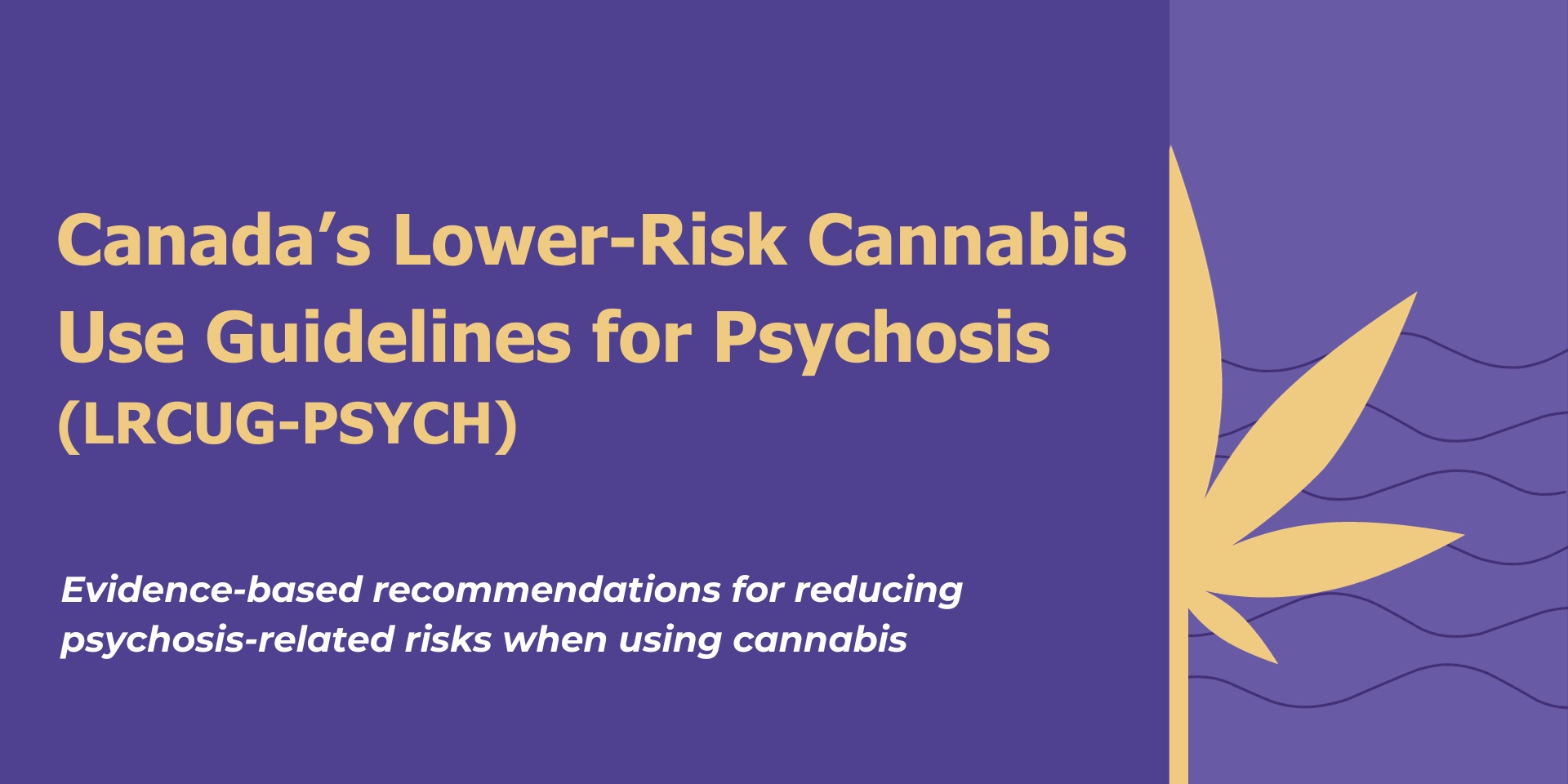Background:
The Lower-Risk Cannabis Use Guidelines for Psychosis (LRCUG-PSYCH) are evidence-based recommendations for reducing psychosis-related risks when using cannabis. The guidelines aim to empower individuals to understand the potential risks related to their cannabis use and to make choices about their consumption to help reduce their individual risk of psychotic outcomes. The LRCUG-PSYCH were developed by a team of international health and addiction experts and are based on a comprehensive review and evidence grading of scientific literature on cannabis use and its associations with the development, course, and outcomes of psychosis. The LRCUG-PSYCH were published in the Journal of Dual Diagnosis in 2023 and consist of 11 core public health oriented recommendations.
Who are the LRCUG-PSYCH for?
The LRCUG-PSYCH are a public mental health resource for psychosis-related education, prevention, and harm reduction for non-medical cannabis use. The guidelines are for:
- Individuals who are thinking about using cannabis or who are actively using cannabis
- Individuals who have a history of, or are at an elevated risk of developing psychosis
- Clinicians, professionals, organizations or government entities dedicated to improving the health of people who use cannabis
LRCUG-PSYCH Materials
- LRCUG-PSYCH Evidence Brief
This resource summarizes the scientific evidence for the 11 recommendations.
Target audience: health professionals, organizations and government entities
Download: English and French (web and print versions) - LRCUG-PSYCH Brochure
This resource summarizes the published guidelines’ 11 recommendations.
Target Audience: Public, including people who use cannabis
Download: English and French (web and print versions)
The Cannabis & Psychosis Clinical Toolkit
In addition to the guidelines, a suite of resources have been developed to support awareness, education and implementation of the LRCUG-PSYCH in community and clinical settings. All tools will be available in both English and French and can be used as online or printed formats.
- Cannabis & Psychosis: Harm reduction posters
These posters are a resource for clinicians and health professionals. They can be used as an environmental cue that encourages open, non-judgmental conversations between clinicians and their clients about cannabis use.
Target Audience: Clinicians
Download:
We Won’t Pass Judgements; English and French (web and print)
Know Your Options; English and French (web and print) - Cannabis & Psychosis Decision Aid: Reflection Journal
This resource is designed to help individual’s at high-risk of psychosis understand and weigh their options in managing their cannabis use. Through a series of reflection exercises, the tool encourages individuals to explore how and why they use cannabis, their unique goals, and determine the best course of action forward in their consumption. It was developed in collaboration with people with lived/living experience of cannabis induced psychosis and is intended to complement clinical care and counselling.
Target Audience: Individuals consuming cannabis who have a history of, or are at an elevated risk of developing psychosis (can be used with a clinician or independently)
Download: English and French (web and print) - Cannabis & Psychosis: Dialogue Support Tool for Clinicians
This resource offers clinicians guidance on how to approach conversations about reducing harms of cannabis use with patients who have experienced psychotic episodes and/or have been diagnosed with psychotic disorder(s) including language to support these conversations. It was developed in collaboration with clinicians and people with lived/living experience of cannabis use and psychosis.
Target Audience: Clinicians
Download: English and French (web and print) - Cannabis & Psychosis: Communication Bridges and Roadblocks Infographic
This resource identifies common communication ‘bridges’ (approaches that can support communication) and ‘roadblocks’ (approaches that can derail or impede communication) in reducing harm of cannabis use in relation to psychosis. It summarizes key strategies to support productive, non-judgmental conversations.
Target Audience: Clinicians
Download: English and French (web and print)



